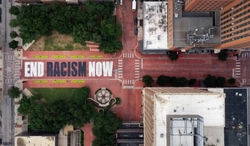 Nine in 10 Americans believe that racism and police violence are problems in the country, a Guardian/Opinium Research poll found, a sign that public opinion is shifting away from the views put forward by President Donald Trump.
Nine in 10 Americans believe that racism and police violence are problems in the country, a Guardian/Opinium Research poll found, a sign that public opinion is shifting away from the views put forward by President Donald Trump. Rasa The US president has been criticised for relentlessly stoking white fear and grievance in recent weeks, putting him at odds with Black Lives Matter anti-racism protests that have swept the nation following the police killing of George Floyd in Minneapolis in May.
But the Opinium survey of 2,000 US adults, conducted for The Guardian between June 19-24, suggests that Trump is out of sync with the mood across the political spectrum.
Some 91% of Americans now agree that racism is a problem in the US and 72% deem it is a serious one. Similarly, 89% think police violence is a problem and 65% consider it serious.
This opinion also cuts across age groups. Although younger Americans are predictably more likely to view racism as a serious problem – four in five (80%) – the view is shared by nearly seven in 10 (68%) of 35- to 54-year-olds and even more (69%) and those over 55 – a demographic group often associated with Trump’s base.
The American president has responded to the demonstrations with animus. Last month security forces used teargas to break up a peaceful protest at Lafayette Square outside the White House so Trump could stage a photo op outside a historic church. He has defended “law and order”, historic statues and, critics say, a legacy of white domination, while fiercely denouncing “the radical left, the Marxists, the anarchists, the agitators, the looters”.
Opinium’s research found that more Americans disapprove than approve of Trump’s response to the protests (47% v 31%). This is true, predictably, of registered Democrats (75% v 12%) but also of registered independents (55% v 27%). Seven in 10 (70%) of those who voted for Trump in 2016 back his actions: 70% approve while 14% disapprove.
The Black Lives Matter protests peaked on June 6 with half a million people protesting in nearly 550 places across America, The New York Times reported this week, and may be the biggest movement in the nation’s history. They have prompted change everywhere from corporate boardrooms to country music to food brands to sports teams. About 60 Confederate statues have been removed or are set to be, while Mississippi voted to remove a Confederate emblem from its state flag.
There has been much debate over whether this will prove a moment or a movement with more lasting impact than protests of the past. The Opinium survey offers a snapshot. The demographic of 18-to-34-year-olds are most optimistic that Black Lives Matter will lead to real change: 56% believe it will, as opposed to 44% of the general population.
Young Americans are significantly more engaged in the movement: 73% of 18-to-34-year-olds have taken some sort of action in support of it compared with 52% of the general population. Almost one in five (18%) have signed a petition in support of the movement versus one in 10 (10%) of all Americans.
About 9% have gone out to protest themselves, versus 4% of all Americans. And 12% of 18-to-34-year-olds were inspired by the movement to check their voter registration versus only 6% of the general population. Nearly five times as many Americans posted on social media to support Black Lives Matter than contacted their government representatives asking for change: 14% as opposed to 3%.
Trump has launched full-throated defences of the police, about which the survey found contrasting views. Three in four people (76%) believe that most cops are good people but there are a few “bad apples”. More than one in 10 (13%) take the opposite view – that most police officers are bad people, but there are some good ones. The former view holds for black/African American respondents, though by a smaller margin (49% to 32%).
With police reform currently stalled in Congress, Opinium found the most widely supported measures are: investigating all use of deadly force by police (74% approve), ban police use of chokeholds and other neck restraints (67%), make police misconduct records publicly available (66%), require officers to use de-escalation when they can (66%), require officers to use alternatives to deadly force when possible (59%).
Some activists have called for police to be “defunded”, though the exact meaning of that term has been contested, and has also been exploited by Trump to sow fear that Democrats and their allies would allow violent crime to flourish.
According to the poll, only one in four (24%) of Americans say they agree with “defund the police” and more than half (58%) disagree. One in three (32%) say they approve of redirecting funding for police departments towards education/healthcare and community social programmes.
Commentators have drawn comparisons with the unrest of 1968. Americans are divided on whether past civil rights leaders would be proud of this current movement and the recent protests. About 39% think Martin Luther King would not be proud, while 36% believe he would be. Americans are more confident that Malcolm X would be proud of this movement: 39% say he would while 20% say not.
The survey was conducted online and weighted to represent the US adult population according to demographics, education and past voting behaviour.
Among those who say they are registered to vote and certain to do so in November’s election, former Vice-President Joe Biden leads Trump by 52% to 40% – a double-digit lead reflected by several other national polls. More than half (52%) of Americans disapprove of the job Trump is doing as president, while little more than a third (36%) approve.